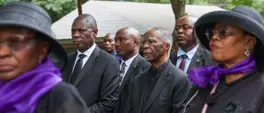S. Korea earmarks $24bn in aid, investment support for Africa
AFP
4 June 2024 | 6:45President Yoon Suk Yeol pledged that the South Korean government would double its current official development aid to Africa to $10 billion by 2030, and would also provide $14 billion of export financing to help Korean firms expand trade and investment across the continent.
SEOUL - President Yoon Suk Yeol on Tuesday announced billions of dollars in new aid and investment support for Africa, as South Korea looks to boost trade ties with the continent.
Seoul is hosting delegations from 48 African countries for a major summit this week, which Yoon had told AFP would aim to secure deals on everything from critical minerals to infrastructure projects.
At the opening of the event, Yoon pledged that the South Korean government would double its current official development aid to Africa to $10 billion by 2030, and would also provide $14 billion of export financing to help Korean firms expand trade and investment across the continent.
"We will also actively contribute to Africa's regional economic integration efforts through the African Continental Free Trade Zone (AfCFTA), which was launched in 2019," Yoon said.
The AfCFTA is styled as the biggest free-trade accord in the world in terms of population, gathering 54 out of 55 African countries, with Eritrea the only holdout.
Yoon also vowed to "accelerate agreements" on multiple other trade partnerships.
While South Korea is eager to expand infrastructure and energy cooperation with African nations, Yoon said the East Asian country was mindful of the impact of climate change on the continent.
Citing projects such as the Olkaria geothermal power plant in Kenya and the construction of the Battery Energy Storage System in South Africa, "Korea will continue to expand its 'green ladder' and respond to the climate change crisis with African countries," Yoon added.
Earlier, Yoon had told AFP that there were "a myriad of viable projects where Korea and Africa can collaborate across the entire field of infrastructure."
That could include "the construction of roads, railways, airports and ports; smart city systems, including smart transportation; and the establishment of master plans," he added.















